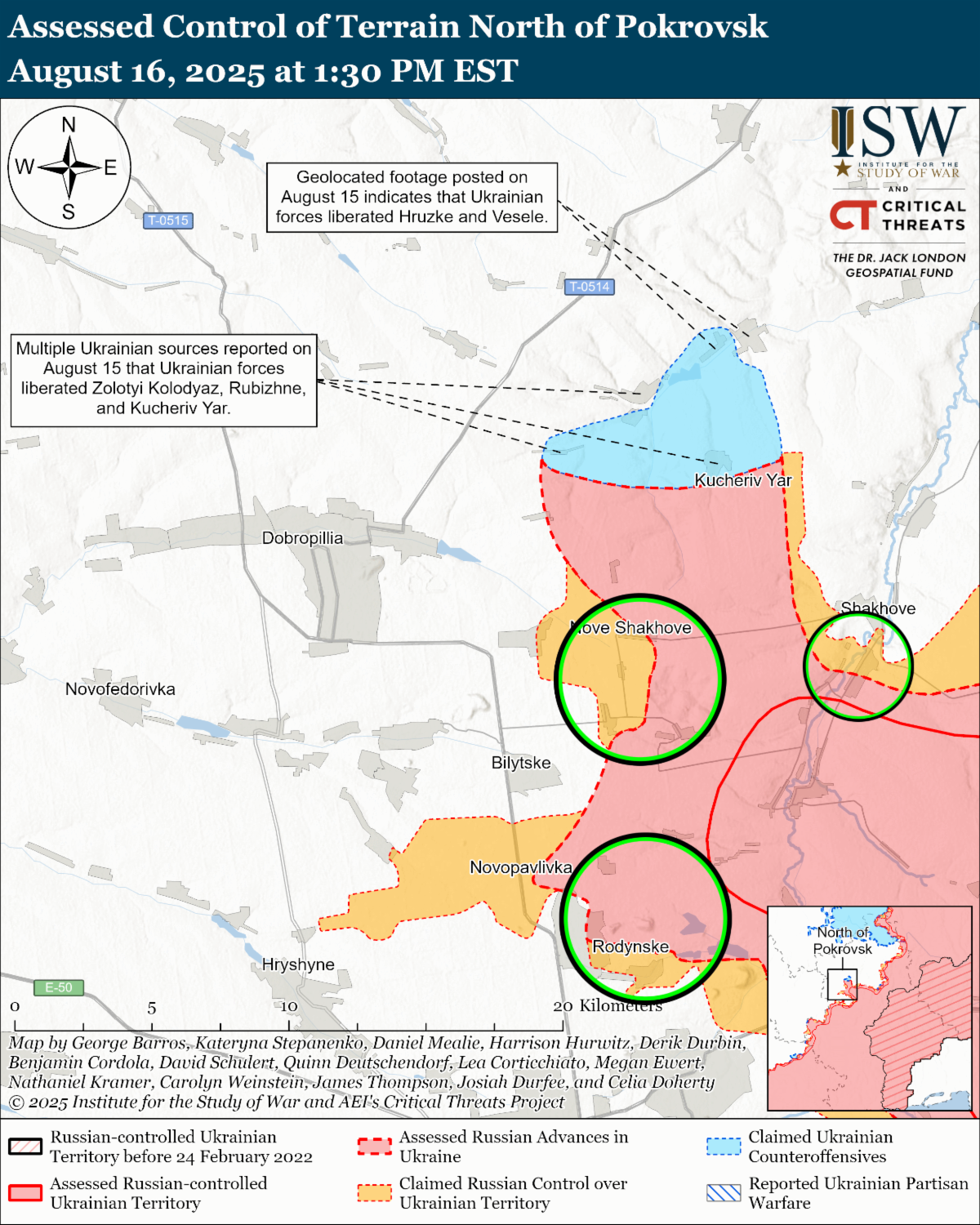Various US officials indicated that Russian President Vladimir Putin may be willing to compromise on some war termination demands, but Putin's own statements and Russian official statements contradict these claims. US President Donald Trump stated on August 16 that his meeting with Putin and subsequent call with Ukrainian President Volodymyr Zelensky and European and NATO leaders were productive. Trump stated following that "all" determined that the best way to end Russia's war in Ukraine is to begin direct negotiations for a peace agreement, rather than a ceasefire agreement. Trump announced that he will meet with Zelensky at the White House on August 18 and that he and Zelensky may schedule a subsequent meeting with Putin if the August 18 meeting goes well. Trump did not specify whether the subsequent meeting with Putin will be bilateral or trilateral, though Trump told Fox News following the Alaska summit on August 15 that both Putin and Zelensky want Trump to attend a leader-level meeting. Axios correspondent Barak Ravid reported on August 16, citing an unspecified source who was on Trump's call with Zelensky and European leaders, that Trump stated that Putin expressed interest in a comprehensive settlement to end the war rather than a ceasefire and stated that "a quick peace agreement is better than a ceasefire." Bloomberg reported, citing sources familiar with the matter, that Trump stated on this call that Putin wants Ukraine to cede all of Donetsk and Luhansk oblasts but noted that it is up to Ukraine to decide what to do with its territory. The sources told Bloomberg that Putin proposed to effectively freeze the front line in Zaporizhia and Kherson oblasts. The sources reported that Trump expressed the United States' readiness to contribute to security guarantees for Ukraine so long as the guarantees do not involve NATO, and that Trump suggested that Putin would accept this. Axios reported, citing a source with direct knowledge of Trump's phone call, that Trump informed Zelensky and the European leaders that Putin claimed that Russian forces were making significant battlefield progress and that Putin could seize all of Donetsk Oblast. The source told Axios that US Special Envoy for the Middle East Steve Witkoff briefed Zelensky and NATO leaders during the call on how Putin views territorial issues and what Putin is willing to give in return. The source reported that Witkoff informed the leaders that Putin is willing to end the war and commit to abstaining from seizing more Ukrainian territory and not to attack Ukraine or other countries in a new war.
It is unclear what Putin offered in his meeting with Trump beyond reiterating his demand for Donetsk Oblast and offering a limited ceasefire with no known timeframe in Zaporizhia and Kherson oblasts. Russian Presidential Aide Yuri Ushakov stated on August 16, after the Alaska Summit, that he did not know when Trump and Putin would meet again and that the subject of a trilateral meeting between Putin, Trump, and Zelensky has not been discussed. Ravid reported that a source briefed on Trump's talks with Putin stated that Putin proposed to freeze the frontline in Zaporizhia and Kherson oblasts in exchange for Ukraine's withdrawal from Donetsk Oblast and that the US delegation perceived that Putin is open to negotiations regarding Sumy and Kharkiv oblasts. Ravid reported that Putin requested that the United States recognize "these four oblasts" (presumably Donetsk, Luhansk, Zaporizhia, and Kherson oblasts, although the reporting is not clear) and occupied Crimea as Russian. The Financial Times (FT) reported, citing four sources with direct knowledge of the talks, that Putin demanded that Ukrainian forces withdraw from all of Donetsk and Luhansk oblasts as a precondition for ending Russia’s war in Ukraine. Three of the sources told FT that Putin offered to freeze the frontline in Kherson and Zaporizhia oblasts and not to launch new attacks to seize additional territory (it is not clear if he meant in those two oblasts or elsewhere), in exchange for Donetsk and Luhansk oblasts. Senior Russian officials and most sources speaking to Western media did not indicate that Putin mentioned Sumy or Kharkiv oblasts, which is notable because Russian forces are also conducting offensive operations in these regions. Newsmax White House correspondent Mike Carter reported on August 15, citing unspecified sources, that Putin dropped his objections to teaching the Ukrainian language in Ukraine and NATO states providing security guarantees to Ukraine that would enable NATO states to defend Ukraine if Russia violates any agreement. Carter reported that the unspecified sources stated that Russia and Ukraine still need to work out the definition and implementation of a ceasefire.
Putin’s demand for all of Donetsk Oblast is the most clear and consistent demand coming out of the Alaska Summit. Putin may have also offered a limited ceasefire in southern Ukraine in exchange for Donetsk Oblast, but other details of Putin's offer to Trump remain unclear. Putin has established territorial demands over the remainder of Donetsk Oblast, which are typically the subject of war termination negotiations, as preconditions for any possible future ceasefire in Ukraine. A former senior Kremlin official suggested to FT that Putin is prepared to compromise on other issues, including territory, if Putin is satisfied that an agreement addresses the “root causes” of the war. The Kremlin has repeatedly defined root causes as NATO's eastward expansion and Ukraine's alleged discrimination against Russian-speakers and has repeatedly invoked this phrase as shorthand for Ukraine's full capitulation to Russia and the resumption of Russian control over Ukraine. Putin's demand that any agreement address these "root causes" is not a compromise from his original war aims, and reports that Putin "compromised" on issues such as Ukraine's ability to teach its own language in its own country are designed to obfuscate Putin's actual unwillingness to compromise. | 





 [ISW] 러시아 공세 캠페인 평가, 2025년 8월 15일
[ISW] 러시아 공세 캠페인 평가, 2025년 8월 15일